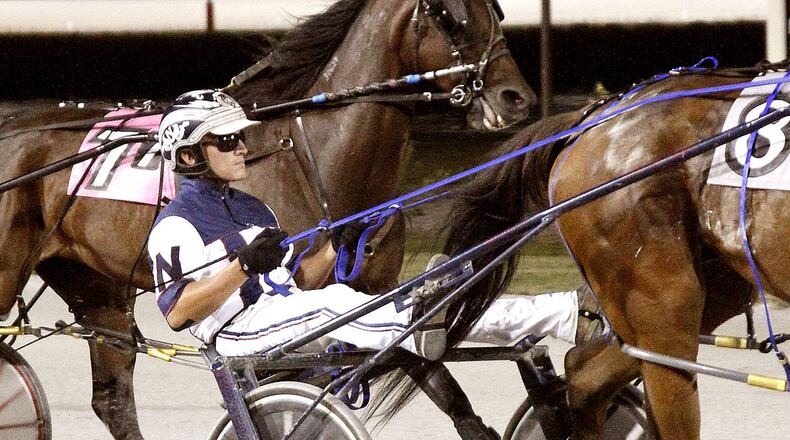All Ohio harness and thoroughbred tracks went dark for 63 days until Scioto Downs outside Columbus started its racing season Friday night.
MORE McCRABB: Living through coronavirus: Big Brother finds new ways to mentor Hamilton 11-year-old
Mindlin, 78, who has been involved with horses for 56 years, said the cancelled racing dates in the state were “a big blow” to horse owners, trainers, drivers and jockeys.
The stoppage caused by the coronavirus came when horse racing in Ohio — fueled by record purses funded by casino revenue — was “an amazing player” in the industry, said Mindlin. He added horse racing and the casinos are “a good match.”
Racinos and casinos throughout the state will remain closed, DeWine has said.
After not racing for more than two months, standardbred horses had to qualify before they were allowed to race for a purse. On Thursday, 17 qualifying races with six horses in each race were contested at the former Warren County Fairgrounds in Lebanon.
Mel Hagemeyer, who served as general manager at Lebanon Raceway before he retired in 2013, helped set up the qualifying races. He said with no racing — money going out and no money coming in — some owners could have survived another month, then they would have been financially forced to sell their stable of horses.
“It almost ruined the horse industry,” Hagemeyer, 72, said of the work stoppage. “Now we are back.”
Like everything else, the sport has been forced to change how it operates. The biggest difference: No fans in the stands.
Other regulations listed in a five-page resolution handed down by the Ohio State Racing Commission include health screenings, masks, limiting the number of horses in a paddock and closed jockey rooms (except on race days).
Drivers, trainers, grooms, veterinarians, judges, officials, transporters of horses, safety outriders and paddock personnel will be permitted on racetrack grounds.
“Normal won’t be normal again,” Hagemeyer said. “But we will make adjustments. You do what you can do to keep the business going. It’s not normal, but at least we’re racing.”
And for that, Jeff Nisonger is thankful.
Nisonger, 39, of Lebanon, is a full-time driver/trainer who has won more than 3,000 races and multiple meet driving titles at Lebanon Raceway and is one of the most sought-after drivers on the Ohio county fair circuit. He said some owners got in financial hardships because while the veterinarian and blacksmith and feed bills continued, purse money stopped.
They were spending more than they were making. Economics 101.
MORE McCRABB: McCrabb: From college musical tour to in-house concert series
As owners were taking a big financial hit, the Ohio Harness Horsemen’s Association offered a program allowing members to purchase feed at a discount, Hagemeyer said.
“Tough business,” said Nisonger, a 2000 Greenville High School graduate who started driving horses at 16.
And now the horsemen won’t benefit from the added revenue generated through the video lottery terminals, a fancy term for slot machines. Nisonger said he saw where the purse dropped 25 percent, from $10,000 to $7,500, for one race at Scioto Downs.
And now, after it was announced the Ohio State Fair was cancelled this year, Nisonger is concerned about harness racing at county fairs. He earned his first win Aug. 18, 1997 at the Darke Country Fair when he guided Bobs Other Barb, a problematic trotter, to the only victory in an 11-race career.
“That would be a shame,” he said of the possibility of county fairs being cancelled.
About the Author

